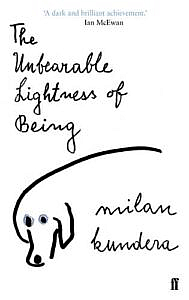
The Unbearable Lightness of Being
When Tereza came into the life of Tomas, she not only carried some psychological insecurities foisted on her from her mother, but also with a copy of Anna Karenina of Tolstoy. Was she obsessed with the character “Karenin”, the husband of Anna, who has the magnanimity of a character and sexuality which was bounded by societal rules? Or the loyalty he had towards his marriage to Anna? Is that the dog was named Karenin, whom she believed is the only one who loved her and gave his whole sincerely when all she could smell of Tomas’s hair was other women’s groin.
Karenin (of Leo Tolstoy) and Tereza have a similar personality – both refused to inquire within which would have led to the lightness of being they abhorred. Whereas Karenin, the dog had her own individuality, and its very freedom lies in giving all of herself to both Tereza and Tomas. Milan Kundera’s compassionate attitude towards animals when he wrote, “True human goodness, in all its purity and freedom, can come to the fore only when its recipient has no power” is the tactile moral burdened Tomas too. Even though Tomas wanted to follow Parmenides to make heavy go to light, even though he believed helping people is by one thing and one thing only: medicine, did he succumb to “Es muss sein!?” (It must be) Did he believe love lies beyond “Es muss sein!”, the meaningful choice which enslaved his fate and the great salvation lies in being with Tereza?
The dichotomy of life’s understanding of humans with respect to good-bad, dark-light, lightness-weight revolves around the story shows each of its mutual dependence. Tomas and Sabina who enjoys the lightness of being without any unnecessary burden are the opposite of Franz and Tereza who wanted to find an integral meaning to their lives. Must Tomas have realized the importance of heaviness(of his own compassion for Tereza) that without it, Lightness doesn’t make sense? Shows everyone’s life choices in which we trap ourselves, not because we don’t have the way out of it but to be there for someone wilfully. Did Tomas make that choice for that specific reason because he is a doctor and wanted to rescue her (from her)?
Somehow Milan Kundera’s stance on challenging Nietzsche’s philosophy and the comparison he drew to Tereza’s dog – Turin horse (of Nietzsche); made me think came from the fact of his own country which was savaged by the Nazi and further lacerated by the totalitarian regime and that’s how Tomas was forced out of his medical profession to become a window-washer. His lines “Mankind’s true moral test, its fundamental test (which lies deeply buried from view), consists in its attitude towards those who are at its mercy: animals” is charged at Nietzsche’s compassion when he hugged the horse and broke down, that was whipped continuously when it refused to move. The film “Turin horse” shows the nihilistic despair of the family which owned the horse living in such poverty and the darkness of life, even the repetitive work and existence itself is heavy. Where the daughter in the climax resigns to her fate like the horse which was uncooperative. Is that the same existential dread everyone suffer of which ended Franz’s life in proving himself in a radical protest, instead of living and experiencing every moment as it comes?
When Franz tells Sabina that a professor accused him of an “Unverifiable speculation”, it seems to readers the honest confession of Milan Kundera where an accusation was leveled at him in reality. His writing just charms us, with no external appearances of the characters rather digging them deep into their inner world and personality. And his subtle, insightful, and sensitive prose in parentheses and the philosophical, political acumen he narrates is another thing to appreciate, which make him stand out from many novelists.
The most beautiful and bold character of Kundera’s artwork of this novel is Sabina, who never cares to betray anyone and cares only about her freedom from all that fetters her down. She believes everything in the world and its problems is because of kitsch, unnecessarily romanticizing both the horror and beauty instead of seeing both as it is. Kundera writes the brotherhood of man on earth will be possible only on a basis of kitsch and the ultimate tragedy of it is the realm of totalitarian kitsch. Which is why we lack the harmony of mind and heart and let each other object it to an understanding with our own biases and emotions?
Though she falls in love with Franz (the heaviest character), Sabina was shrewd enough when she stopped herself from asking Franz to hold her tight like the banalest of women even with that overwhelming desire. Did the woman with a bowler hat who consider it as a symbol of eroticism, who goes for a walk through the cemetery, who left her native land with a thought of no place is home (like Kundera himself) and her choice of being alone in her own individualism which in itself caused an unbearable lightness of being?



